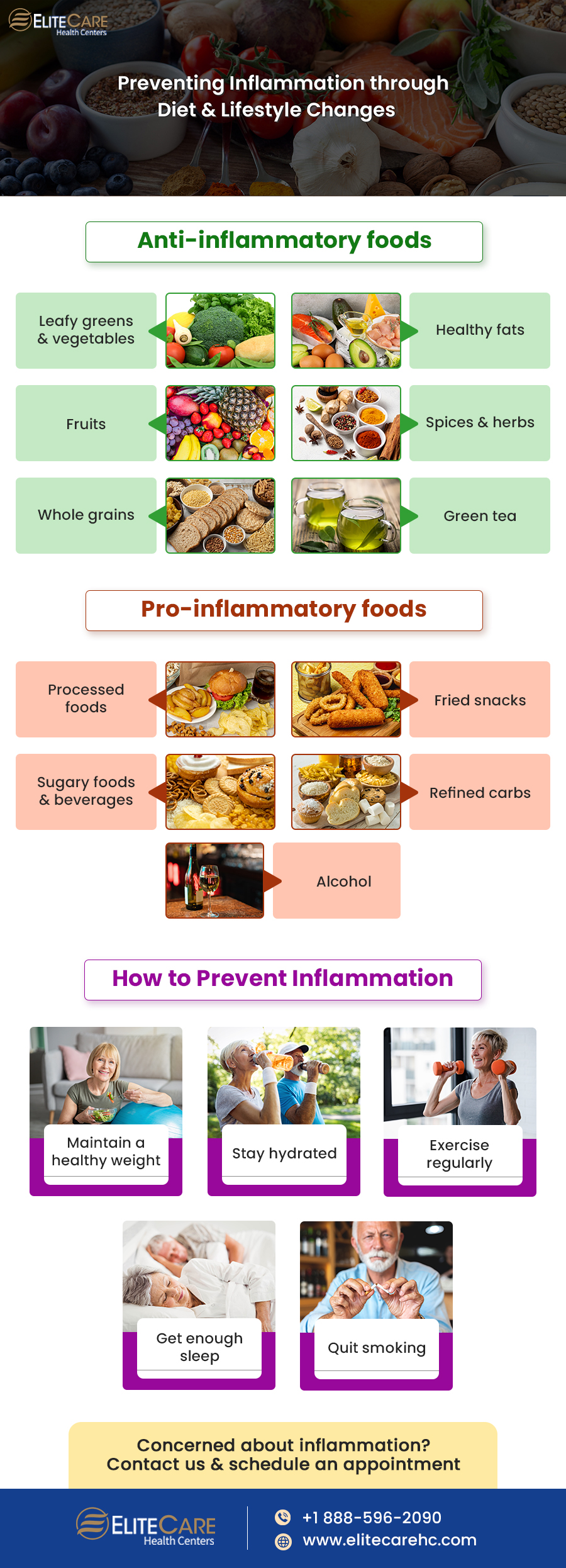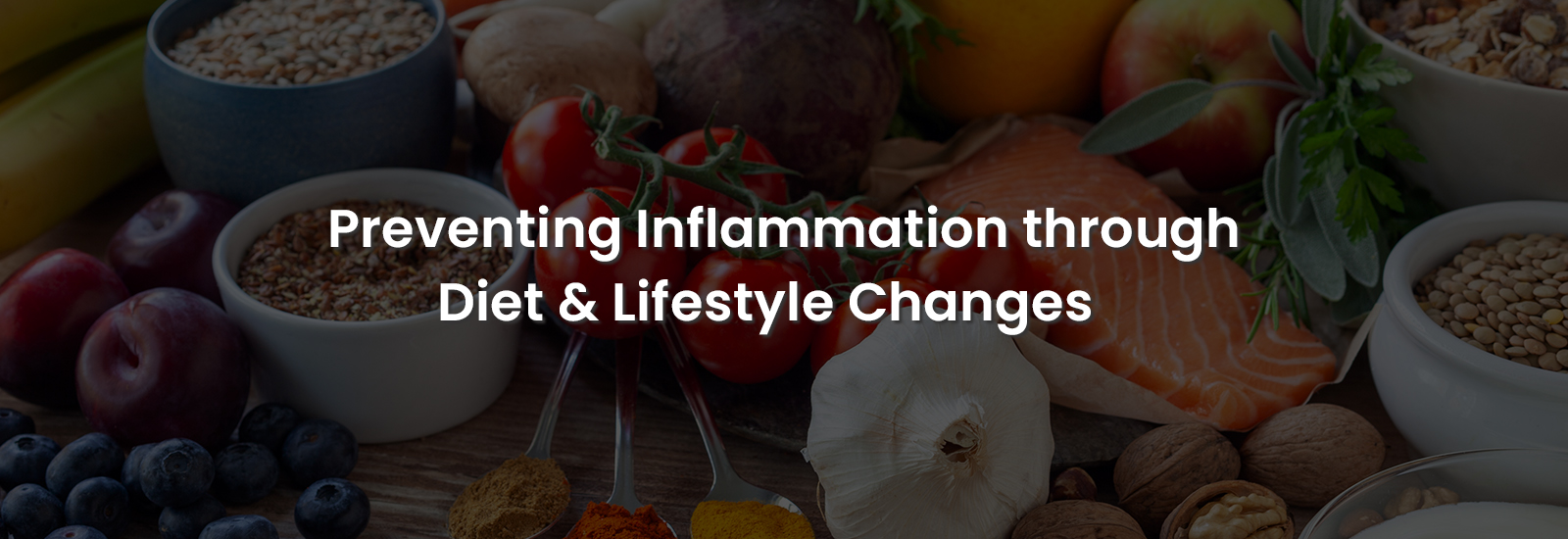
Chronic inflammation is one of the primary causes contributing to the most common chronic health issues, such as diabetes, arthritis, bowel diseases, etc. It has become a widespread problem in the US, with approximately 60%* of the population suffering from some form of chronic inflammation.
In this blog post, we will share detailed information about inflammation, its causes, and how to prevent it effectively with a few healthy choices. Read on to learn more.
Read More: Is Arthritis Preventable in Seniors?
What Is Inflammation?
It is a natural biological process that occurs whenever our immune system detects an injury, illness, or infection. This is a complex response that involves various immune cells, signaling molecules, and tissues working together to protect the body from any external threat.
During the inflammatory response, immune cells increase the white blood cells production and release a few chemicals such as cytokines, prostaglandins, and histamine. These chemical substances dilate the blood vessels to become more permeable. As a result, immune cells move easily from the bloodstream into the affected tissues to combat the invading pathogens and repair any damage.
However, when this immune response becomes chronic or happens uncontrollably, it can lead to inflammation in the body and result in a wide range of health problems including rheumatoid arthritis, inflammatory bowel disease, etc.
What Causes inflammation?
There are a variety of factors, including infections, injuries, exposure to toxins, etc, which can cause inflammation. The following are some common causes of inflammation:
- Infections caused by a virus, bacteria, or other pathogens
- Physical injuries, such as cuts, bruises, and broken bones
- Extended exposure to environmental toxins, such as pollutants and harmful chemical substances
- A sedentary lifestyle includes a poor diet, lack of physical activity, smoking, excessive alcohol consumption, etc.
Dietary Change to Avoid Inflammation
Diet plays a crucial role in preventing inflammation in the body. The following is a list of foods to eat and avoid for preventing inflammation:
1. Anti-inflammatory foods
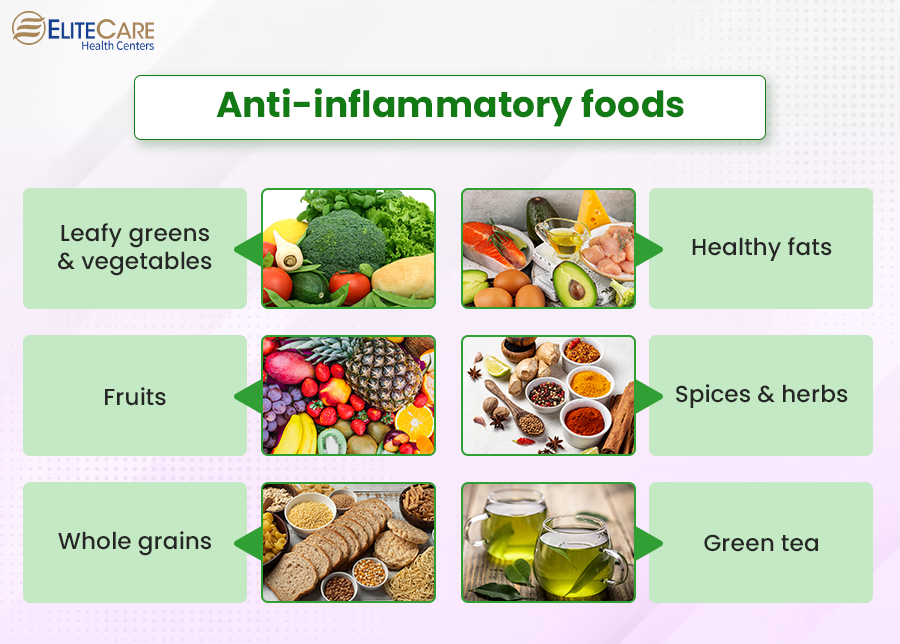
- Leafy greens and vegetables like kale, spinach, broccoli, brussels sprout, cauliflower, etc
- Fruits, especially those with deep colors, such as berries, citrus fruits, pomegranates, etc
- Whole grains including brown rice, quinoa, whole wheat bread, etc
- Healthy fats such as those found in fatty fish, nuts and seeds, avocado or olive oil, etc
- Spices and herbs like turmeric, ginger, garlic, etc
- Unsweetened beverages like green tea
2. Pro-inflammatory foods
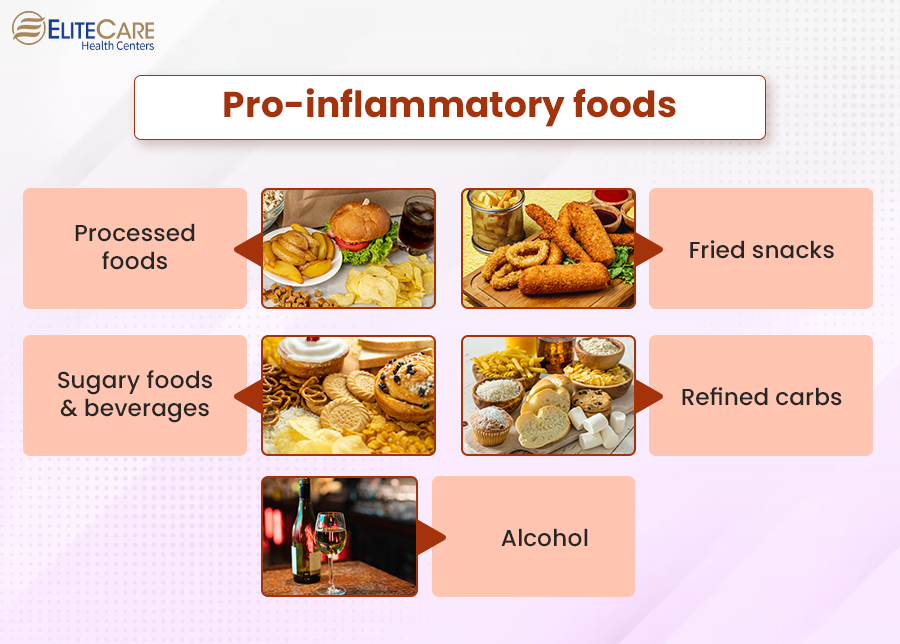
- Processed and fried foods including canned foods, processed meats, etc.
- Sugary foods and beverages such as candy, soda, store-bought baked goods, etc.
- Refined carbs including white bread, white pasta, etc.
- Excessive alcohol consumption
However, individuals should consult their provider as well as a certified dietitian before making any significant dietary changes.
5 Lifestyle Changes to Avoid Inflammation
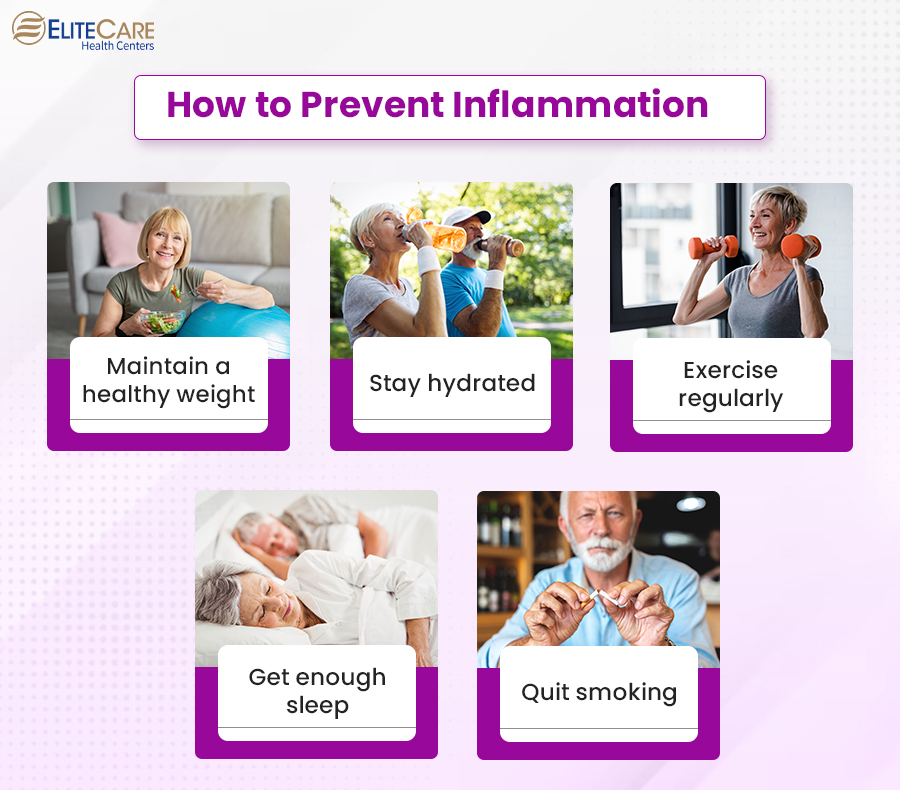
In addition to the dietary alterations, the following lifestyle changes can also help prevent inflammation:
1. Maintain a healthy weight
Excess body weight can increase the production of pro-inflammatory chemicals, eventually contributing to chronic inflammation. In order to maintain a healthy weight, it is important to follow balanced diet and engage in regular physical activity, such as cardio and strength training.
2. Stay hydrated
Adequate hydration can help balance the levels of pro-inflammatory chemicals in the body. In addition, individuals should limit their intake of sugary drinks, such as soda and sports drinks which have pro-inflammatory characteristics.
Drinking at least 8 ounces of water every day can help maintain adequate hydration. Additionally, increase fluid intake on hot or humid days and avoid consuming alcohol which can significantly contribute to dehydration. Apart from drinking water, individuals may also choose unsweetened tea, soups, natural fruit juices, etc. to increase their fluid intake.
3. Exercise regularly
Studies have revealed that regular exercise can reduce inflammation by reducing levels of inflammatory markers in the body. Besides, it can also prevent obesity, one of the major risk factors for inflammation.
Practice moderate-intensity exercise for at least 30 minutes every day, five days a week. To increase its effectiveness, incorporate a variety of exercises, such as cardio, strength training, and flexibility exercises.
Individuals who are new to exercise should begin slowly and gradually increase the intensity and duration of their workouts. Consult a primary care physician as well as a professional trainer before starting any new exercise regime.
4. Get enough sleep
When we sleep, our body produces cytokines, a protein that helps regulate the immune system and fight off infections and inflammation. Sleep deprivation can interrupt the production of cytokine, causing an imbalance in the immune system and an increased inflammatory marker.
Furthermore, lack of sleep can also increase the production of stress hormones, such as cortisol. Chronic stress and elevated cortisol levels can damage the tissues and organs, eventually resulting in inflammation.
Individuals should aim for a minimum of 7 to 8 hours of sleep per night and practice good sleep hygiene habits. Relaxation techniques such as meditation, deep breathing exercises, or yoga are also useful in improving the quality of sleep.
5. Quit smoking
Cigarette smoke contains numerous toxic chemicals that can trigger the immune system to produce an inflammatory response. Research has shown that smoking increases the levels of pro-inflammatory cytokines in the body, which can contribute to chronic inflammation. In addition, it is also crucial to avoid second-hand smoke that contains the same toxic chemicals and irritants as directly inhaled cigarette smoke.
Quitting smoking can be challenging, but there are several resources available to make the process easier. Consult a senior care service and talk to a primary care physician about nicotine replacement therapy, medications, or other resources that can help in quitting.
When to See a Doctor
It is important to see a doctor if the following symptoms of inflammation are persistent or severe:
- Pain or swelling that does not improve
- Fever or chills
- Shortness of breath or difficulty breathing
- Chest pain or pressure
- Persistent cough
- Unexplained weight loss
- Chronic fatigue or weakness
- Joint pain or stiffness
- Skin rashes or other changes in skin appearance
These symptoms are not exclusive to inflammation and may also be indicative of a more serious underlying condition, such as an autoimmune disorder or infection. Visit a healthcare clinic and consult a healthcare provider at the earliest to receive an accurate diagnosis and appropriate treatment.
For any queries or concerns over any health issues, contact EliteCare Health Centers, one of the best medical clinics in Florida, offering state-of-art senior care services. Visit your nearest EliteCare healthcare center to schedule an appointment with our board-certified primary care physicians.
*Data retrieved from Harvard Health. (2020, April 1). Understanding acute and chronic inflammation
